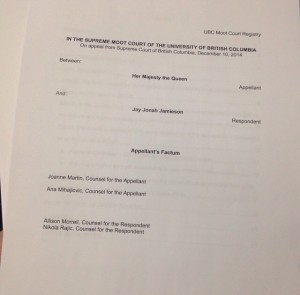On Thursday I did my moot and it was awesome. It was tons of fun, totally different from anything I’ve ever done before, an experience that all law students should have, AND it actually wasn’t as scary as it sounded at first. Even the people who had horror story experiences came out alive and now have a better idea of whether litigation is something they want to do or not.
Just like everything in first year law (and beyond apparently), a lot of the time you’ll feel like you don’t know what you’re doing. For someone who likes to be in control, getting over this and just learning to ride it out is something that I’ve gotten way better at, but still struggle with. From the original read through of the assignment (so are we arguing FOR this guy or..?) to the basics of HOW to actually structure a factum (font? 12pt? 11pt? Double spaced? Double sided?) you constantly wish someone would just tell you what to do and how to do it.
Embrace it. By the time moots have some around, you’ll have experienced the infamous baptism by fire many times. It’s pass/fail and no one fails. So relax and don’t be scared to ask questions of your peer tutors, profs, and older friends.
The moot is a big deal in the sense that everyone talks about it, knows about it, and has war stories from it. You will be getting a lot of advice and all the stuff that people told me in the weeks leading up to it was helpful. At the end of the day, you just have to DO it to see what it’s really like. So I’ll leave that part to you. But before I sign off, I do want to give you some morsels of advice that I personally learned from doing my moot last night – things no one had told me, and things that might be helpful as you prepare
It’s about the judges
The oral part of your submissions/case is really about the judges getting clarification from you on certain points. Maybe there was something in your factum that didn’t make sense. Maybe they didn’t understand how you went from one point to another. Or maybe they are convinced by a point but they want you to REALLY convince them. The best way to prepare is to actually anticipate questions they might ask you and prepare answers.
Write out your intro and a conclusion — those you might want to just read (but maintain eye contact and don’t be super monotone!) – however, everything else should be structured around questions that you might be asked.
What happened to me was that I basically re-wrote my entire factum in anticipation for this epic oral speech I thought I was going to give. My paragraphs flowed from one to the next in a chronological order that was persuasive, bold, and passionate.
It was a winner yet I never got to read it. I read my intro, laid out my arguments, and got interrupted. When the judge asked me a question I made the mistake of saying “it’s in my factum, let me just find it” – DONT DO THAT. They want you to ANSWER the question like a human being, not a robot search engine. Don’t look it up, don’t try to go back to speech reading, remember, it’s not about your fabulous speech — it’s about them. Give them what they want and be flexible! This means you have to know your arguments inside out. But that’s fine, because after spending so many coffee-induced nights writing and re-writing your parts of the factum, you will know your arguments, whether you want to or not. Help the judges see it your way.
Bring water
Not only does it get hot under those robes (refer to next heading), but the fight or flight experience of it all makes your palms sweaty and your mouth dry. When you get up there to talk it might feel like your tongue is swollen and can’t fit in your mouth — having some water on hand to take a sip will help immensely. Also, being able to sip water in case of (or in order to avoid) a coughing fit will save you tons of time and embarrassment
Trust me on this
Go easy on the layers
Like I said, it gets hot under those synthetic robes and the anxiety of it all will have you pretty hot already. I am someone who is PERPETUALLY freezing, so if I was hot, you know it’s serious. While you do have to dress professionally, your clothes will cover you from neck to knees/ankles depending on the robe you get. I wore a suit jacket/blazer but if you wear a dressy shirt and black pants/skirt, you can probably just ditch the suit jacket/blazer before getting gowned.
Don’t forget to be formal
Speaking of professional dress, remember to be professional in your interactions with the lawyers prior, during, and after the moot. At my moot, we had found the room and got settled in before the lawyers arrived. We moved desks around, placed a water bottle in front of each judge’s chair, and got ourselves organised. When they came in, we had our gowns on and zipped up. We didn’t stand or anything but we did say hi, and engaged in some polite small talk. The moot commenced shortly after that where we were expected to address the judges as My Lord and My Lady. I kept forgetting to say it, but technically, every time you address them after they’ve addressed you (usually after they ask you a question), you’re supposed to say it. I didn’t and the world didn’t end but it’s just something to keep in mind
After the moot they might invite you for drinks. The venue will usually be Koerner’s or some other pub on campus/close to the law school. They pay for it, so don’t stress about the tab, just go and have some fun. You can drink but remember to only have as much as you can handle so that you can still act professionally
But then again, no need to be super formal
In general, I found the whole moot experience less rigid and formal than I expected. Before you ever moot or have a court experience, you have all kinds of images in your head. The fact that we have to gown and repeatedly say My Lord/Lady makes it that much more serious and formal sounding. But surprisingly (and maybe it’s because it’s just the 1L moots), the way I conversed with the judges was not that much more formal/professional than the way I conversed with lawyers at wine and cheese events or with my professors in class. Obviously its not exactly the same type of conversation as a casual wine and cheese because in this situation you’re trying to prove a point so you’re actually speaking more persuasively and formally; but ultimately, if you’ve had a professor like Edinger who uses the Socratic method and expects you to know your case(s), you’re set. They’ll ask you to focus on a certain aspect, ask you to clarify a specific thing, maybe ask you a hypothetical, ask you for the facts or the provision and how it relates to another etc. If you’re prepared, you’ll be fine. Just speak with them like you would with your professor when they’re grilling you about a case — judges actually like engaging in a dialogue and we were encouraged to be conversational and non-robotic. And remember, because it’s about them, just do your best to follow their lead
Get organised
As with law school in general, I cannot stress the importance of being organised. Have your book of authorities tabbed, both the Appellants’ and the Respondents’ factums on hand, marked off if needed, ensure you have the Act/provisions you’re expected to tackle and any provisions mentioned in any of the other cases especially if they are used in your or “your friend’s” factums. Sometimes a judge will ask you to go back to your factum on page x to ask for clarification or to point something out. Being able to find it quickly and be right there with the judge is not only important for the sake of flow, but you’re also under a time pressure so being able to answer questions quickly and move on is key. It also makes you look professional and organised which never hurts. What’s also not a bad idea is to know the facts, decision, ratio, court, and judge who wrote the judgement (and any important dissents), written out on a separate sheet of paper. A judge might ask you to remind them what a certain case was about or how and why some case that you mentioned, applies to the case at hand. Being able to answer those questions is important and being organised helps immensely
Write stand alone arguments
As I already mentioned, my oral arguments had flow and were written the way I write my papers. This was a mistake because I kept getting interrupted, which prompted me to use all of my best arguments to answer the question at hand, and then when I was given the opportunity to continue with my oral submissions, I didn’t know where to begin. The best thing you can do, is to have a sheet that’s full of anticipated questions and ready-made answers, and another one that has stand alone arguments/paragraphs that can be read either together as part of one large “speech” or separately. Know how to come back to your oral submissions, where and how to pick up, and how to keep making your case without repeating it. This is the hardest thing to do and I still don’t know how to do it but it’s something you should keep in mind because getting interrupted happened to all of us and it’ll probably happen to you too. If you oral submissions are too rigid and your paragraphs too interdependent, you will struggle finding flow again after you’ve been interrupted.
Keep it in perspective
It’s easier said than done but the reality is: it’s a pass/fail assignment. if you legitimately try, you work hard on it, and you show up, you will pass. If your factum has some holes in it, the worst thing that’ll happen is that either the respondents or the judges will shine a spotlight on them. You don’t get your factum marked/returned to you for a few weeks after the whole moot experience so no, you don’t get feedback on your factum before you go into the moot, and any mistakes you make with it will have to be salvaged at the moot. This not only goes for the arguments themselves but for the formatting too. Do your best, ask for examples from older peers, and then just DO IT. There is no room for perfectionism here — nor is it expected. I had to keep reminding myself that there really wasn’t anyone up for first degree murder and no one was paying me to win. Once you put it in perspective, you can focus on the actual experience, give your brain the chance to learn something from the experience, and to have fun. And honestly, I had a blast as did most people. Most of us are here because we like to argue and we like to be right. You get 30 min to prove your point.
Go out there and show them what you’ve got!






Ana – you’re amazing. -Sarah